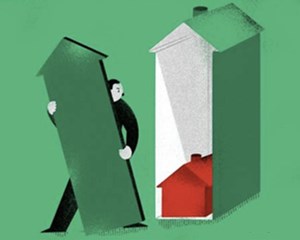University challenge
大學挑戰
The returns on housing investment are not what they are cracked up to be
住房投資的回報并不是他們所吹噓的那樣
Brits, it is said, have a penchant for nostalgia. So take a trip down memory lane to the autumn of 1997, a happier time. The British economy appeared to be gathering speed. The Bank of England raised interest rates to 7.25%. But how resilient was the consumer? A drop in retail sales could be put down to Princess Diana's funeral. The bigger puzzle was the property market. House-price in-flation on the Halifax measure was in the mid-single digits. The Nationwide index had it rising into the teens. It was unclear which of these gauges was right.
據說英國人對懷舊情有獨鐘。所以,沿著記憶的小路回到1997年的秋天,那是一段更加快樂的時光。英國的經濟似乎正在加速。英格蘭銀行將利率提高到了7.25%,但消費者的適應能力有多強?零售銷售額的下降可能要歸咎于戴安娜王妃的葬禮。更大的謎題是房地產市場。按照哈利法克斯的衡量標準,房價漲幅在個位數中間。全國范圍內的指數已經漲至百分之十幾,目前還不清楚哪一種衡量方法是正確的。
Trying to work out whetherthe economy is strong or very strong is a nice problem to have. But this episode from the 1990s highlights something else. Measuring house prices is trickier than measuring the price of shares or a basket of consumer goods. Getting a good handle on total returns is harder still. Long run ground-level data on rental income and maintenance costs are rather scarce.
想要弄清楚經濟是強勁還是非常強勁是一個很好的問題,但這段發生在20世紀90年代的插曲還凸顯了另一個問題:衡量房價要比衡量股價或一籃子消費品的價格更加棘手,而想要很好地搞清總回報更是難上加難,因為有關租金收入和維修費用的長期現實數據少得可憐。

A new paper deals with these difficulties by drawing on the archives of the endowment funds of four Oxbridge colleges, which for centuries have been big investors in property. Two of them (Trinity College, Cambridge, and Christ Church, Oxford) were founded by Henry VIII, who conferred a portfolio of land on both. The study finds that after-cost returns to housing were considerably lowerin the 20th century than previously thought. Property is a farless attractive investment than you might expect.
一篇新論文利用了牛津和劍橋四所學院捐贈基金的檔案資料解決了這些難題。幾百年來,這四所學院一直是房地產的大投資者。其中兩所學院(劍橋的三一學院和牛津的基督教堂)是亨利八世建立的,他給這兩所學院都授予了土地。研究發現,在20世紀,住房的成本后回報率遠低于之前的預期。房地產是一項遠沒有你想象的那么有吸引力的投資。
Only a small fraction of houses change hands each year. They may not be representative of the overall stock, and thus of changes in housing wealth. The average sales price might rise from one period to the next simply because more houses that are bigger, of better quality or in nicer locations are being bought and sold this yearthan last year. This is why most closely watched gauges, including the Halifax and Nationwide indices, adjust transactions for characteristics such as the number of bedrooms. Still, some quality improvements (or degradations) will evade even the most careful statistician.
每年只有一小部分房屋易手。它們可能不能代表整體存量,也代表不了房產價值的變化。平均售價可能會從一個時期上升到下一個時期,僅僅是因為今年比去年有更多更大、質量更好或位置更好的房屋被買賣。這就是為什么最受關注的指標,包括哈利法克斯指數和全國指數,會根據臥室數量等特征來調整交易。然而,即使是最細心的統計學家也無法發現一些質量上的改善(或下降)。
譯文由可可原創,僅供學習交流使用,未經許可請勿轉載。











